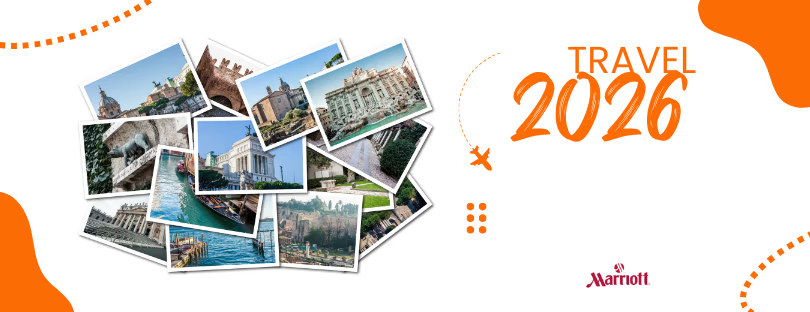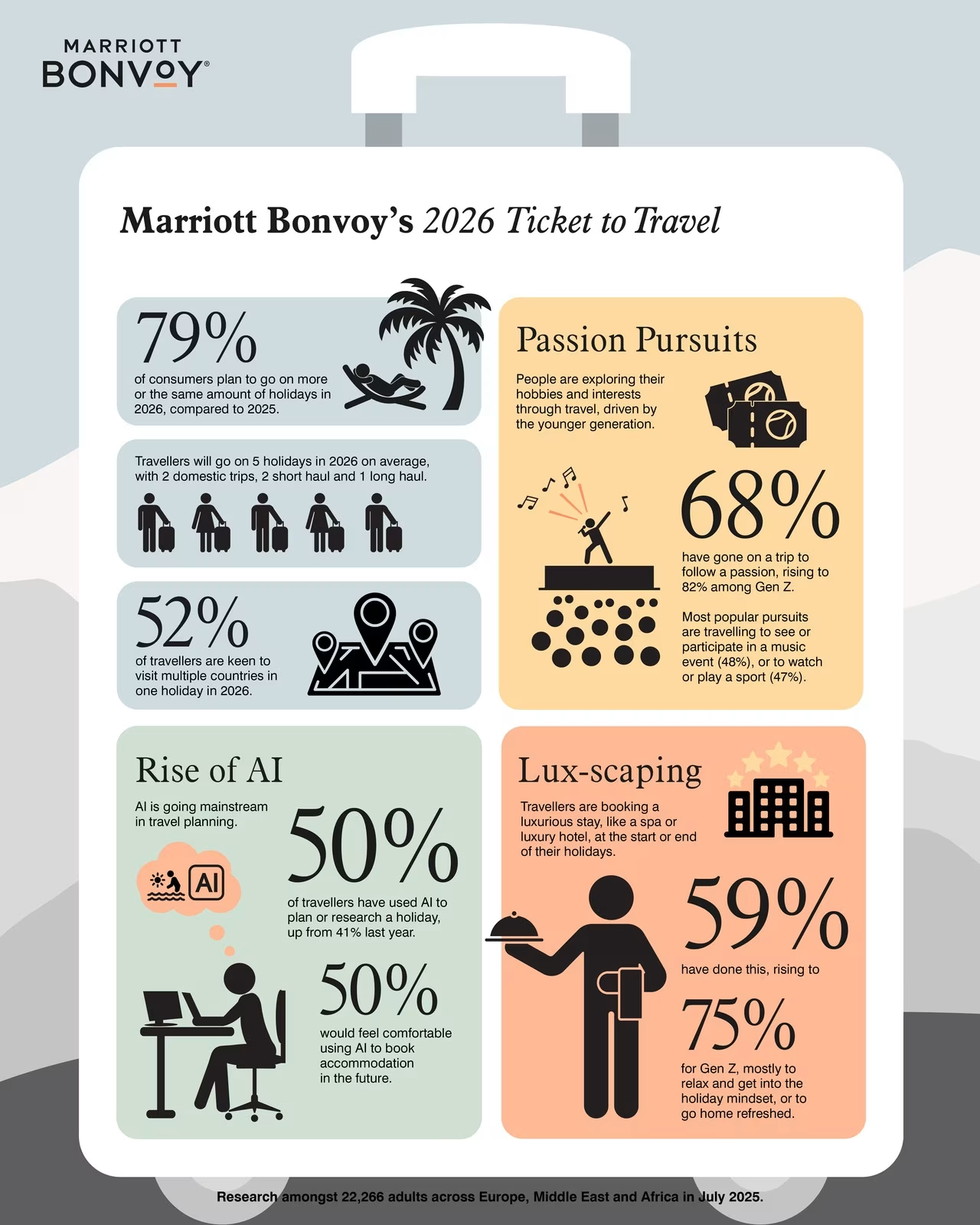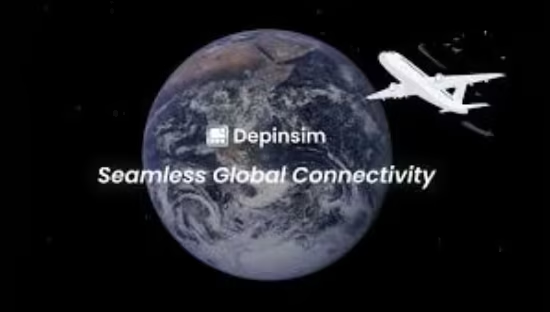
Inside Marriott’s 2026 Travel Report: More Holidays, Smarter Planning, and the Rise of “Lux-Scaping”
Despite economic uncertainty and global challenges, travellers across Europe, the Middle East, and Africa show no signs of travel fatigue. According to Marriott Bonvoy’s 2026 EMEA Ticket to Travel Report, four in five (79%) people across the region plan to take the same number or more holidays next year compared to 2025 — and nearly four in ten (39%) plan to take more. Marriott 2026 Travel Trends
The study, conducted by Mortar Research among more than 22,000 adults in 11 EMEA markets, paints a confident picture for the year ahead. The average traveller expects to take five trips in 2026: two domestic, two short-haul, and one long-haul.
Booking data also reveals a set of emerging hotspots: Oslo, Algiers, Muscat, Split, Zagreb, and Copenhagen are among the destinations gaining traction for 2026. These are not just the traditional heavy-hitters — they reflect travellers’ growing appetite for secondary cities that balance culture, value, and access to nature.
AI Becomes a Trusted Travel Companion
Artificial intelligence has gone mainstream in the travel planning process. Half (50%) of travellers across EMEA say they’ve already used AI to plan or research a trip — a sharp rise from 41% last year and just 26% two years ago.
Among younger generations, the numbers are even higher: 71% of 18–24-year-olds have tried AI for trip planning, and one in four (24%) of 25–34-year-olds say they use it all the time. Interestingly, older travellers are also catching up — 29% of those aged 55–64 have used AI, up from 18% last year.
The trust gap is closing fast. Half of all respondents (50%) say they’d feel comfortable booking accommodation through an AI platform, while only 18% say it would make them uneasy. It’s a sign that what started as an experiment is quickly becoming a core part of travel decision-making.
For travel brands, this shift signals a need for seamless, AI-driven experiences that can handle the entire booking journey — from inspiration to itinerary.
Lux-Scaping: Indulgence in Small Doses
One of the most intriguing travel trends highlighted in Marriott’s report is the rise of “lux-scaping”—the act of indulging in a luxurious experience at the start or end of a trip. Think of a few nights at a five-star spa resort before a long adventure or a city-break splurge before heading home.
Nearly six in ten (59%) travellers have already tried lux-scaping, and 22% have done so in the past year alone. Among younger groups, the trend is even more pronounced—35% of 25–34-year-olds and 29% of 18–24-year-olds treated themselves to a mini-luxury escape in the last 12 months.
When asked why, travellers cited three main reasons:
- 46% say it helps them relax and get into the holiday mindset.
- 43% say it makes the return home more refreshing.
- 29% say it lets them experience a level of luxury they couldn’t sustain for a full trip.
It’s a smart, experience-driven form of self-care — one that’s less about status and more about well-being and balance.
The Passion-Led Traveller
Travel is increasingly about meaning, not mileage. Marriott’s research identifies the continued rise of “passion pursuits” — holidays designed around personal interests or events.
Almost seven in ten (68%) EMEA travellers say they’ve taken a trip primarily to follow a passion. Nearly a third do it every year. The leading motivations include:
- Attending or participating in a music or cultural event (48%)
- Travelling for sport, either to watch or play (47%)
- Embarking on an adventure experience, such as a safari or trek (39%)
Younger generations are driving this shift: 82% of Gen Z and 77% of millennials have taken a passion-pursuit trip in the last year. In contrast, only 63% of Gen X have done so.
This suggests that the future of travel marketing will lean more into storytelling, experiences, and emotional resonance rather than pure price or destination.
Country-Hopping Gains Ground
The report also highlights the growing popularity of multi-country trips. More than half (52%) of respondents say they plan to visit at least two countries during a single holiday in 2026 — a figure that jumps to 66% among 25–34-year-olds.
Once considered a niche pursuit, country-hopping is becoming easier thanks to open borders, rail expansion, and flexible travel platforms. While this has long been a feature of Middle Eastern and African travel patterns, it’s now gaining real traction across Europe too — particularly among younger, time-rich but budget-conscious travellers.
What Travellers Want from Accommodation
When it comes to choosing where to stay, travellers remain practical. The top priorities remain cleanliness (89%), price (88%), and location (87%).
However, the study also highlights growing interest in other factors:
- 58% value properties that are solo-traveller-friendly
- 47% say pet-friendly accommodation matters
- 45% plan to book all-inclusive holidays — now the most popular trip type ahead of resorts, city breaks, or wellness retreats
Sustainability also continues to matter, though not yet universally. Nearly three-quarters (73%) of travellers say they consider the environmental impact of their trips at least some of the time, and 32% checked the sustainability credentials of their accommodation on their last trip.
A Confident Market, With Shifting Priorities
According to Andrew Watson, Chief Commercial Officer for Marriott International – EMEA, the findings “signal strong optimism for the industry” and highlight how deeply travel remains embedded in people’s lifestyles and spending priorities.
What’s particularly striking, he notes, is how technology and lifestyle values are converging.
“AI has embedded itself into the travel experience,” Watson says. “At the same time, travellers are exploring new ways to access luxury, follow passions, and maximise experiences.”
Conclusion: Marriott’s Findings Mirror a Global Reboot of Travel
Marriott’s 2026 outlook mirrors what we’ve seen from other major players. Expedia’s Traveler Value Index for 2025 forecasted a similar rise in purpose-driven and experience-led travel, while Hilton’s 2026 Trends Report highlighted “bleisure” (business-plus-leisure) and wellness escapes as growth areas. Booking.com’s Future of Travel 2025 also reported a doubling in travellers using AI-powered tools to plan trips.
In essence, the EMEA traveller is optimistic, digitally empowered, and increasingly guided by passion rather than price. The coming year will reward brands that understand that shift—blending technology, empathy, and creativity to deliver more meaningful journeys.











